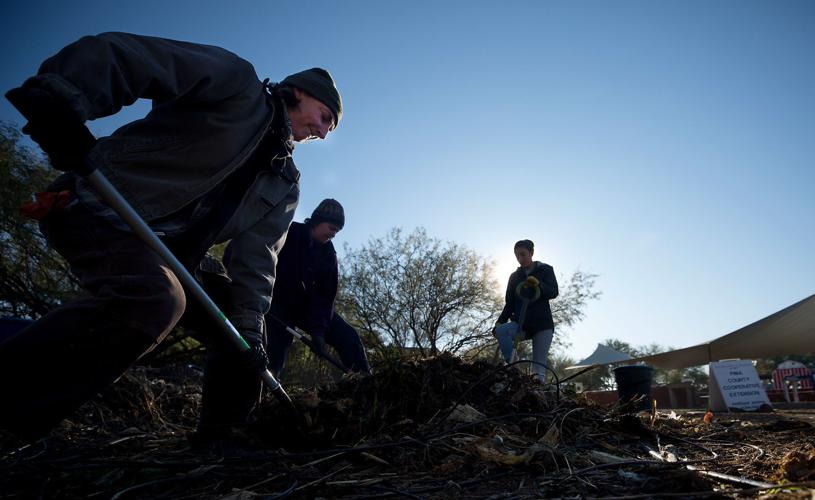Several yards away from the 60,000 or so cars whooshing up North Campbell Avenue every day, Tucson Village Farm volunteers are cleaning a chicken coop, turning compost and showing children and families how to grow, cultivate and enjoy eating vegetables.
Over the last 10 years, a dirt lot has become a working, seed-to-table, urban farm bursting with rows of leafy greens, picnic tables and red-barn design sheds. The farm will celebrate its 10th anniversary by beginning its transition to a new field on Monday, Jan. 20, the MLK Day of Service.
NEW DIGS
Tucson Village Farm is nestled in the Campus Agricultural Center, the University of Arizona’s a 160-acre research, teaching and extension facility that flanks North Campbell Avenue and is south of the Rillito.
The farm is moving from land it uses on the west side of Campbell Avenue to a larger plot on the east side of Campbell — the former Karsten Turfgrass Research Facility, which moved to the Maricopa Agricultural Center in Pinal County.
About 5 acres at the former turfgrass facility will be cultivated and the main building on the site is being renovated into the Angel Charity for Children Culinary Education Center, which will be the core of the new 4-H Healthy Living Campus.
Before the field can start sprouting, the campus needs some work, which kicks off Monday, Jan. 20, on the MLK Day of Service.
There will be a laundry list of tasks that children and families can do, says Elizabeth Sparks, 4-H youth development assistant agent, who oversees programming efforts of Tucson Village Farm. There will be some brawn-building activities like digging out Bermuda grass and cattails, and creative projects such as making stepping stones and working on art projects.
Volunteers will gather at the farm entrance off east of Campbell Avenue and ride a hay wagon to the new plot, says Sparks. A photograph of the volunteers and workers will be snapped at 11 a.m. Monday, Jan. 20, Sparks says.
The soil in the former turf facility requires considerable remediation, so a summer crop on the new field is not expected, says Sparks. Planting is expected to begin in the fall.

From left to right, Olivia Ridge, Nicole Parks and Mary Powell, AmeriCorps volunteers, turn over the compost pile at Tucson Village Farm.
WHAT’S COOKING
A $445,000 grant from nonprofit Angel Charity is funding the existing building’s conversion. The culinary center will have a commercial teaching kitchen, a dishwashing area, and space for art projects and offices. They expect to cut the ribbon on the center in April, Sparks says.
“The kids are most excited about the dishwasher,” quips Sparks.
The culinary center was originally planned as a new building; however, the availability of the former turf-research space made converting the existing building financially efficient, says Jeffrey C. Silvertooth, associate dean and director for Arizona Cooperative Extension.
The farm currently lacks its own commercial kitchen space — they use a converted conference room — and the equipment was outdated, says Sparks.
Among the farm’s goals are to help people learn how to prepare vegetables and make them delicious, says Sparks. The farm can teach how to “sneak” veggies into foods, like spaghetti sauce with sweet potatoes, or “hide” veggies in foods, like mac-and-cheese laced with cauliflower.
“Vegetables can be delicious,” says Sparks.
Demonstrating how to make salads and simple dressings and how to make healthy choices on a budget are also on the farm’s task list, says Sparks.
The culinary center is immediately adjacent to the field and produce, next to the Rillito River Park Trail, and there are plans for learning and play spaces, landscaping and a paved promenade, says Sparks. A ropes course is also planned, says Sparks, facilitator of the 4-H High Ropes Course at the University of Arizona West Campus Agricultural Center on West Fort Lowell Road.

The Angel Charity Culinary Education Center for Children is under construction at the Tucson Village Farm.
The site is “so perfect in so many ways,” says Sparks.
PRACTICAL SCIENCE
Tucson Village Farm is filled with “enthusiasm and spirit” says Silvertooth, who says it “is a youth development and education program.”
“It’s a STEM (science, technology, engineering and mathematics) program.”
Kids are able to learn how to plant, cultivate and prepare foods, all of which involve STEM skills.
The farm is involved with the schools, he says. Teachers and parents are learning as much as the students, says Silvertooth.
The programs — available for toddlers through teens — and camps fill up quickly and the additional space should allow the farm to serve more kids, Sparks said. Registration for 2020 summer camp for kids ages 4-18 will begin Feb. 1.
The farm is a program of the Pima County Cooperative Extension and the University of Arizona, and is in line with the UA’s mission as a land grant university, explains Silvertooth.
UA was designated land-grant institution when it was established in 1885. Land-grant universities were established with the Morrill Act in 1862, which was signed by President Abraham Lincoln during the Civil War. The act aimed to extend access to education to the working class.
In 1914, the Smith-Lever Act created cooperative extension services at each land-grant institution.
The Tucson Village Farm is fulfilling this fundamental land-grant mission, says Silvertooth, which is “to take the university to the people and to bring science to bear on practical problems.”









